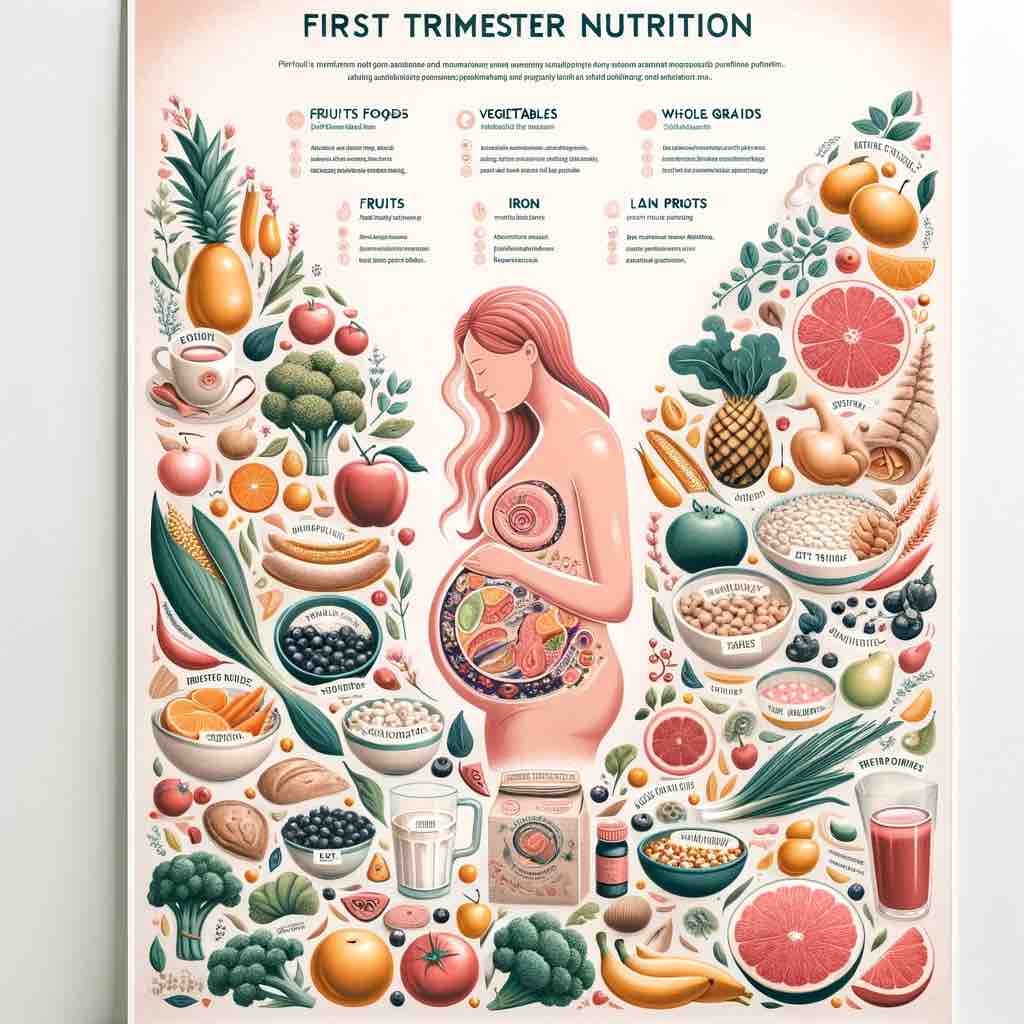
Welcome to the First Trimester
Embarking on the first trimester of pregnancy is an exciting time filled with significant changes and developments. Nutrition during these initial weeks plays a crucial role in supporting both your health and your baby’s growth. This detailed guide will explore the key nutrients, dietary strategies, and tips to navigate common challenges during the first trimester.
Understanding the Nutritional Needs
During the first trimester, your body begins the incredible process of growing a new life. Here are the essential nutrients to focus on:
- Folic Acid: Vital for preventing neural tube defects, a daily intake of at least 600 micrograms is recommended. Sources include leafy greens, citrus fruits, and fortified foods.
- Iron: Supports increased blood volume and prevents anemia. Aim for 27 milligrams per day through red meat, poultry, fish, lentils, and fortified cereals.
- Vitamin D and Calcium: Crucial for fetal bone and teeth development. Dairy products, fortified foods, and sunlight are excellent sources.
- Omega-3 Fatty Acids: Important for brain development. Include sources like fatty fish, flaxseed, and walnuts in your diet.
- Choline: Essential for brain development and placental function. Eggs, lean meats, and some vegetables are good sources.
Calorie Intake and Weight Management
Contrary to the popular saying, you’re not exactly “eating for two” in terms of calorie intake. The first trimester doesn’t require a significant increase in calories. Focus on nutrient density rather than quantity.
Dealing with Morning Sickness and Food Aversions
Morning sickness can make it challenging to maintain a balanced diet. Here’s how to cope:
- Small, Frequent Meals: Eating small, frequent meals can help manage nausea.
- Ginger: Ginger tea or ginger candies can alleviate morning sickness.
- Stay Hydrated: Sipping water throughout the day helps, especially if you’re experiencing vomiting.
Balancing Macronutrients
A balanced diet that includes carbohydrates, proteins, and fats is essential:
- Carbohydrates: Opt for complex carbs like whole grains, fruits, and vegetables for sustained energy.
- Proteins: Lean meats, dairy, legumes, and tofu are excellent protein sources.
- Healthy Fats: Avocados, nuts, seeds, and olive oil provide necessary fats for fetal development.
Managing Cravings and Unhealthy Eating Habits
Pregnancy cravings are normal, but it’s important to manage them healthily:
- Healthy Alternatives: Find healthier alternatives to satisfy cravings. For example, frozen yogurt instead of ice cream.
- Moderation: It’s okay to indulge occasionally, but try to keep portions small and balanced with nutritious foods.
Exercise and Physical Activity
Moderate exercise is beneficial during the first trimester, unless otherwise advised by your healthcare provider. Activities like walking, swimming, and prenatal yoga can support your physical and mental health.
Mental and Emotional Well-being
Your mental health is as important as your physical health. Stress management techniques, adequate rest, and seeking support from loved ones or professionals can help you navigate the emotional changes during this time.
Next Steps
Remember, each pregnancy is unique. Consult with healthcare professionals to tailor your diet to your specific needs and to address any concerns you have about nutrition or symptoms.
Looking Ahead
Stay tuned for our next post, where we’ll delve into the nutritional specifics of the second trimester, a period of significant growth and development for your baby.
Join us as we continue to explore the fascinating journey of pregnancy nutrition, ensuring a healthy start for you and your little one!
FAQs for First Trimester Nutrition
- How much folic acid should I take in the first trimester?
- Aim for at least 600 micrograms of folic acid daily. It’s crucial for preventing neural tube defects in the developing fetus.
- Is it normal not to feel hungry during the first trimester?
- Yes, it’s normal. Appetite changes are common due to hormonal shifts and morning sickness. Focus on small, nutrient-dense meals.
- What are the best sources of iron for pregnancy?
- Lean red meats, poultry, fish, lentils, spinach, and iron-fortified cereals are excellent sources.
- How can I manage morning sickness?
- Eating small, frequent meals, staying hydrated, and including ginger in your diet can help. If nausea is severe, consult your healthcare provider.
- Do I need to increase my calorie intake in the first trimester?
- Not significantly. The first trimester doesn’t require a large increase in calories. Focus on nutrient-rich foods rather than calorie quantity.
- Can I continue my regular exercise routine?
- Generally, yes, but it’s best to consult with your healthcare provider. Moderate activities like walking and prenatal yoga are typically safe.
- What should I do if I have food aversions?
- Try to find alternative sources of nutrients that you can tolerate. If you’re struggling, a dietitian or your healthcare provider can offer personalized advice.
- How important is hydration during the first trimester?
- Very important, especially if you’re experiencing morning sickness. Aim for at least 8 cups of fluids daily, including water, milk, and herbal teas.
- Can I have caffeine during the first trimester?
- Moderate caffeine intake (about 200mg per day) is generally considered safe, but it’s best to consult with your healthcare provider.
- What vitamins should I be taking during the first trimester?
- Prenatal vitamins are recommended to ensure you’re getting enough folic acid, iron, calcium, and other essential nutrients. Your healthcare provider can recommend a specific brand or formulation.
Blog Tags for the Post
pregnancy nutrition, first trimester, healthy eating, prenatal vitamins, morning sickness remedies, diet during pregnancy, folic acid, iron intake, pregnancy hydration, exercise in pregnancy, managing food aversions, pregnancy health, maternal wellness, pregnancy journey








